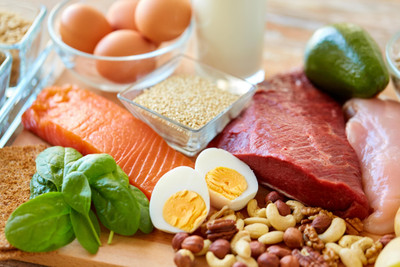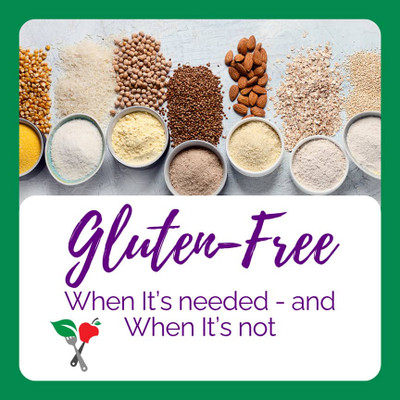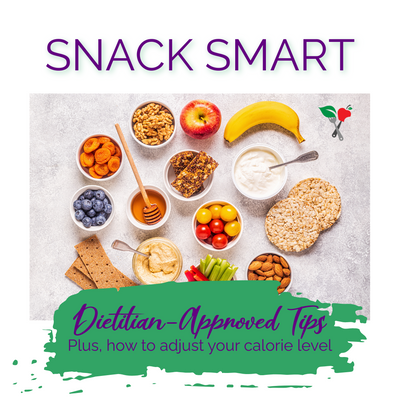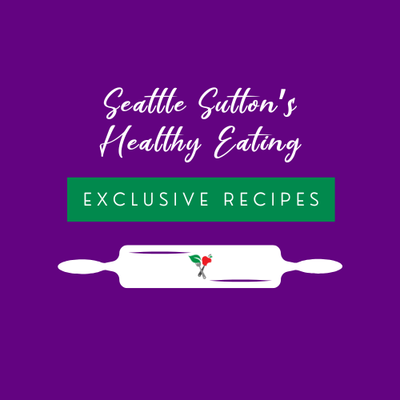Protein Pointers: Tips to Boost the Benefits
Beginning in their 40s, adults typically lose 1 to 2 percent of their muscle mass every year. Eating the right amount of protein throughout the day can help maintain muscle mass. Other benefits of protein consumption include reducing bone loss, helping to maintain a healthy weight, and more. Adults with more muscle mass have more independence, better balance, and less risk for falls and fractures. Avoiding muscle loss as we age also helps keep our metabolism revving which helps with weight management. In short, protein is essential for maintaining muscle and health as we age.
Eat Protein at every meal
Most people eat very little protein in the beginning of the day and a lot at the end of the day. Consuming protein evenly spread throughout the day helps ensure you have a steady source of amino acids to pull from instead of breaking down muscle. Breaking up protein intake evenly throughout the day can provide some other important benefits including:
1. Building muscle
2. Healing wounds
3. Fighting infections
4. Controlling blood sugar
5. Sustaining energy
6. Strengthening bones
7. Controlling appetite
The general recommendation is to aim for 3 to 4 ounces of protein at each meal. High-protein foods to focus on include chicken, fish, beans, lentils, nuts and seeds, dairy products, and eggs. Meals with closer to 30 grams of protein, spread out between 3 meals per day appears to stimulate protein synthesis more effectively than meals with less than 20 grams of protein.
It’s important to continue to focus on balanced meals when increasing your protein intake. When carbohydrates and fats are included in adequate amounts, proteins are spared so they can do the work that only proteins can do. When carbohydrate and fat intake is insufficient, muscle loss can be an unintended consequence as the body will convert protein to glucose to meet the body’s energy needs. Bottom line: include all of the food groups at each meal!
What counts as an ounce?
1 ounce of cooked meat, fish, or chicken (3-4 ounces is about the size of a deck of cards or the palm of your hand)
¼ cup of cooked beans, peas, or lentils
1 egg
1 tbsp. of peanut butter (about the size of half a golf ball)
½ ounce of nuts or seeds (12 almonds, 7 walnut halves)
1 cup of milk or yogurt
1.5 ounces of hard cheese (about the size of 3 dice)
¼ cup of cottage cheese
When reading food labels, the protein is listed in grams. One ounce of protein is 7-8 grams on the label. Remember, your goal is 3-4 ounces or 20-30 grams per meal.
Limit Red and Processed Meats
There is a large amount of evidence of the clear link between diets with high amounts of red and processed meat and an increased risk for cancer, heart disease, and diabetes. A good guideline is to limit red meat to no more than two to three servings per week. The research suggests that people with a lower intake of red and processed meat have lower health risks. If you are including red meat, it is ideal to think of it more as a side dish rather than the main course.
Do I need a protein supplement if I’m a vegan or vegetarian?
Just because someone’s meals are meatless does not mean their diet is low in protein. There are plenty of plant-based protein sources that provide sufficient protein. The key is to plan out balanced meals, focus on good variety, and to be sure to include a good source of plant based protein at every meal. Good choices include beans and peas, grains, nuts, seeds, and eggs and dairy (if not vegan). In most cases, protein supplements are not necessary if you are following a well-planned vegetarian diet and are in good health.
Don’t forget exercise
Protein and exercise together help build and repair muscle, which is crucial for staying fit for everyday activities. If you’re an older adult, a moderate increase in the amount of protein you eat, along with resistance exercise, may help you retain muscle mass and strength. Evidence shows that having a high-protein meal or shake after a workout may promote muscle building for those who are physically active. Be wary of using protein shakes to replace meals if your goal is to lose weight. Protein shakes move through the stomach much quicker than other sources of protein which may lead to hunger sooner than if you had a balanced meal.
Focusing on a healthy, balanced diet provides us many benefits as we age. Including adequate amounts of protein and getting a good variety of protein foods are key when trying to boost the benefits protein foods provide.

Interested in eating healthy? Hungry for more?







 Weight Loss
Weight Loss Health & Wellness
Health & Wellness Diabetes
Diabetes Heart Health
Heart Health Motherhood & Family
Motherhood & Family Dietary Restriction
Dietary Restriction Other Health Conditions
Other Health Conditions About SSHE
About SSHE


